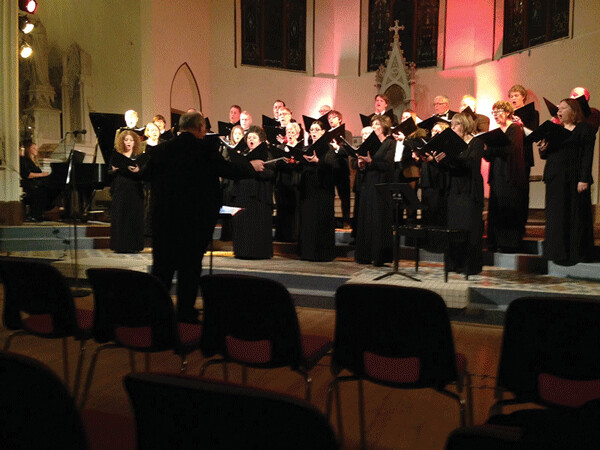News & Articles
Browse all content by date.

My musical tastes lean a bit toward the intense side of the spectrum. I get involved in a great variety of styles, but I really enjoy intriguing music that I’ve never heard before. This past weekend both Arrowhead Chorale and the Duluth Superior Symphony Orchestra offered programs that were definitely on the adventurous side. I fully approve.
Minnesota composer and new talent from North Carolina
Back in the 1970s, Stanley Wold, artistic director of Arrowhead Chorale, sang tenor in a Twin Cities choir along with another young musician named Craig Carnahan. As it turned out, Wold has spent a career directing choirs at the college, community, and high school levels. Carnahan has spent a career composing sacred and secular music for just such choirs. After some forty years, Wold chose to feature an entire concert of choral compositions by Carnahan. Carnahan was on hand, happily, to add his comments and introduce each piece as it was shared at the Sacred Heart Music Center last Friday night. This was precisely my cup of tea.
The Chorale began in the organ/choir loft with two sacred pieces, an Alleluia! I Will Sing, followed by a darker setting from the text of Psalm 130, a plea from someone in the depths of disillusion. Local organist, Velda Bell, accompanied Psalm 130 from the historic Felgemaker organ, in this very energized setting of the Psalm.
Then the choir moved to the front of the auditorium for ten more pieces set to texts by Sara Teasdale, Walt Whitman, Siegfried Sassoon, Perry Brass, and Rabindranath Tagore. Carnahan also assisted in the details of a composition contest hosted by the Chorale. In response to a very public announcement, Arrowhead Chorale received 60 choral compositions from composers all around the USA.
Final decisions led to a Sara Teasdale poem, Did You Never Know, set by a young choral director from Southern Pines, North Carolina, Matthew Lyon Hazzard. This tender love song lingered in the air long after the choir finished. This was an entire evening of choral music with both composers alive and in the room talking about their work. The rich textures of the twenty-eight singers was wonderful, along with the clean piano playing from Lexy Land. Sometimes the men, sometimes the women, sometimes all the chorale, offered this exquisite music in the lovely resonance of Sacred Heart.
Hidden Treasures Coming to Light Again in 2017
Then on Saturday night, Music Director Dirk Meyer and the DSSO offered a program of lesser known music by very well known composers. The young violinist Yevgeny Kutik offered an emotional performance of the Violin Concerto (1904) by Aleksandr Glazunov. This very melodic, Romantic, work moves through a strong first section, an incredibly beautiful second section, a long, virtuosic cadenza, and a dazzling third section. At this point the violinist lightly and rapidly touches his strings to create harmonics - very high pitches that can only be played with precise delicacy. The audience was clearly impressed with Kutik’s amazing finesse.
Meyer had chosen L. Beethoven’s Fourth Symphony in this process of recording all nine of Beethoven’s symphonies. Personally, the fourth, second, and seventh are my own personal favorites, but in the concert halls of the world, they do not appear very often. With a moody beginning, the first movement then sparkles away with a great deal of joy. The slow movement is quite lyrical, then the energy returns for the third and fourth movements. This is pretty happy Beethoven, even though March, 1984, was the last time the DSSO shared it locally.
Jean Sibelius left us seven symphonies, and the seventh was featured at this concert. This very brooding work contains four sections, all within about a twenty minute time frame. As I’ve written before, Dirk Meyer has an incredible sense of story-telling with his baton. The narrative unfolds purposefully right before us. The trombone keeps punctuating the string resonance, and the strong melodies come and go over the top of each other, changing the mood and tensions frequently. An enormous amount of tension builds toward the final chords, but then Sibelius resolves the tension and the symphony very warmly closes with a sense of immense satisfaction. It has been thirty-eight years since we have heard this in Duluth, so this was a fitting climax to an evening of Hidden Treasures.
This has been a weekend of musical delights, and I can only wish every concert was as creative and refreshing as these two have been.
| Tweet |


